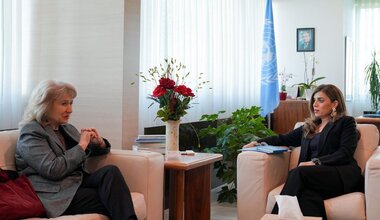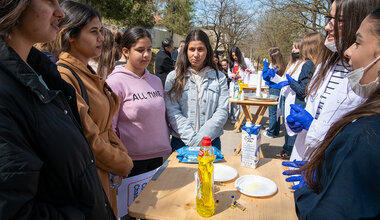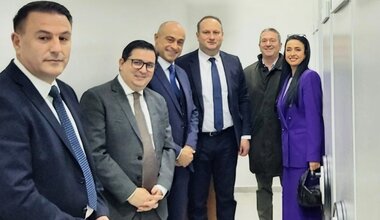Statement by the Special Representative of the Secretary-General and Head of UNMIK to the Security Council
Mr. President, Distinguished Members of the Council,
As reflected in the details of the report before you, the situation in Kosovo, and between Belgrade and Pristina, is again at a fragile moment. Today’s meeting coincides with a significant anniversary: twenty years since this Council last agreed a full resolution in response to the conflict. Over those twenty years, there has clearly been progress, and change in a myriad of dimensions, in Kosovo, in the region, and in the world. At the same time, we should make an additional reflection: In the absence of a genuine and necessary process of engagement between the parties to this conflict, the situation does not simply remain tenuous, but can slide backwards. Often it has done so. Productive engagements between Belgrade and Pristina have been missing since autumn 2018, and while much attention is focused upon day-to-day disputes and provocations, these are not the only factors complicating efforts to return to negotiation.
The imposition of a 100% import tariff on Serbia and Bosnian goods by Pristina last November continues, despite a near-unanimous call by the international community for its removal. Belgrade’s position is that lifting the import tariffs is a minimum condition for resuming talks under the EU-facilitated format. Pristina leaders have also set out public conditions, though not always with unity of voice, and while a Pristina negotiating team has been created, its full responsibilities await clarification. To reduce these complex nuances into a single assessment: multiple inconsistent public signals have hampered all efforts to ensure the full engagement of both parties in a single or definitive process.
In such a circumstance, leaders from all sides must exercise their responsibility of steering this complex situation clear of any serious escalations. Engagement in good faith, without threats and ultimatums, is necessary for re-establishing the conditions for the resumption and continuation of political dialogue. I hope that all parties engaged may be able to work collectively to ensure that the planned meeting in July in Paris is used by the parties to return to substantive matters: those which directly affect the lives of people and communities.
Engaging more actively with a wider array of stakeholders; Demonstrating a commitment to advancing the interests of the populations hoping for better opportunities; Meaningful and equal participation of all segments of the society: Each of these elements is essential to achieving a measure of political process, but unfortunately each appear to have been lacking in the efforts we have observed during this past period.
Mr. President,
One of the significant developments since the end of the official reporting period was the organization of elections in the four Kosovo Serb-majority municipalities in northern Kosovo. Following the resignations of the mayors of these municipalities in response to Pristina’s increase of the import tax on Serbian and Bosnian goods, the President of Kosovo called an extraordinary election, which took place on 19 May. The election proceeded peacefully. According to Kosovo’s Central Election Commission, the elections resulted in a clear victory for the Serbian List candidates who already held power in the relevant municipalities, and who received above 90 per cent of the vote. Restricted electoral competition and limited political participation in Kosovo-Serb communities were issues underlined by some of the diplomatic representatives monitoring the election process.
Mr. President,
On the morning of 28 May, the Kosovo police conducted a special operation – concentrated mainly in the northern municipalities – targeting smuggling and organized crime suspects, under warrants issued by the Pristina Basic Court. The operation led to the arrest of a number of suspects, including local officials. Suspects and Kosovo police officers were injured in the course of the operation.
During this operation, two UNMIK staff members based in Zubin Potok, one international and one locally recruited, were arrested and injured, in separate incidents. It is a United Nations responsibility to determine objectively the circumstances affecting its staff, which we have already been undertaking, in a systematic manner in full accord with UN practice, as well as with the imperative to determine the facts expeditiously. This is particularly important for you to know, given the extent of unverified information and speculation which has since appeared in the public domain.
Today, I would like to put on record just a few pertinent points.
Firstly, relevant immunities of our staff members from arrest and detention have failed to be observed. United Nations property was also improperly seized and searched, in contravention of all relevant laws and the Organization’s immunities.
Secondly, despite our requests and a normally productive working relationship with authorities in Pristina, the situation at present is that the authorities have shared very little relevant or factual evidence with the United Nations about the arrest and injury of our staff. Simultaneously, Kosovo authorities have issued statements, in the press, as well as in correspondence directed to UN Member States. This information lacks an adequate evidentiary basis, contrary to much of our understanding so far, and avoids matters essential for an objective enquiry.
Thirdly, the day after the transfer outside Kosovo of our international staff member to receive required medical treatment, he was publicly declared “persona non grata,” upon which occasion I received in parallel a communication from Pristina authorities stating the same. As already stressed, the doctrine of “persona non grata” does not apply to, or in respect of, UN personnel.
Fourthly, I am alarmed that both staff members were apparently subjected to excessive force and mistreatment upon their arrest by police, causing injuries requiring hospitalization. This is a matter which will form an essential component of the enquiry we have initiated.
During these events, I was obliged to call repeatedly for the immediate release of UN staff, as well as respect of their rights and immunities. This would not have been necessary had the authorities respected the immunity of UNMIK personnel, and communicated with the mission in a more forthright and timely manner. Nonetheless, we remain hopeful that communication from the highest levels of Pristina authorities will improve as we work to clarify the precise circumstances of 28 May.
I wish also to make clear that our mission stands fully behind all efforts by the Pristina institutions to combat organized crime networks and to eliminate public corruption. This struggle, as I emphasized in my public statement on 28 May, must also sit within the framework of international rule of law and human rights principles, which are guarded by the United Nations, and foremost by this Council.
Mr. President,
Regardless of events such as the ones on 28 May, UNMIK continues to focus its efforts and resources toward the objectives of peace and stability in Kosovo and the region. We will do so effectively only with your direct support.
Internally, I am constantly reviewing our mission priorities, and will need your support in order to ensure that we continue to fulfill our role in the most efficient and appropriate ways. Our approach is guided by the Secretary-General’s prevention agenda, epitomized by the Mission’s focus on trust-building between communities. In this, we work closely with all actors who are engaged in good faith efforts to transform the environment from one of ‘contained conflict’ into one of peace and progress.
In collaboration with the United Nations Kosovo team, and our other international partners on the ground, we continue to empower trust-building actors, including in the areas of language rights, human rights more broadly, youth empowerment, gender equality, justice and intercommunity dialogue. We have followed a roadmap created during the United Nations Kosovo Trust-Building Forum of May 2018, utilising public spaces in Kosovo to underline the priority of reconciliation expressed by Kosovo’s leadership. The debates we are fostering are designed specifically to tackle the most sensitive areas of public concern, including the political decision-making process, religious tolerance, empowering the younger generation, and the daunting challenge of overcoming the past and ensuring a more just and peaceful future for the next generations.
We pursue our goal of being directly engaged with Kosovo institutions to help the implementation of human rights initiatives and legislation. Although largely drowned out by the news stories of the same time frame, on 24 May, the Working Group on missing persons met in Pristina, agreeing several very practical steps jointly to uncover further information needed to address still-unresolved cases. The same group will soon submit a report documenting the actions since 2004, during which identifications in over 3,300 cases were accomplished.
We constantly seek innovative avenues to promote trust, together with all our partners. We hope that the institutions from both sides will continue to join us in this effort. The third United Nations Youth Assembly, co-organised by UNMIK and UNICEF, with the vital participation of the United Nations Secretary-General’s Envoy on Youth, produced specific recommendations for young people from across Kosovo to engage their government and non-government institutions. The Global Open Day on Women, Peace and Security in Pristina, in collaboration with the European Union, highlighted the need for greater inclusion and engagement of women, including in the highest political processes. I would also like to take the opportunity to welcome the initial contribution to the trust fund established in support of Ashkali, Egyptian and Roma communities. The Secretary-General has urged additional contributions which are essential to respond adequately to the needs of these vulnerable groups.
UNMIK will continue to work closely with our international partners, particularly the EU, and KFOR, as well as with the many bilateral actors who are investing their resources in Kosovo’s stability, community reconciliation and economic development. Our international partners have invested substantial resources in Kosovo and the region; and the parties have expressed their desire to move ever closer to the European Union. I therefore call upon the parties to do their part and assume responsibilities for delivering on the objectives of normalisation and helping to bring not only a more lasting stability, but growing prosperity, to this region.
Mr. President,
In closing, on behalf of all UNMIK staff, I wish to thank the Council for its support and to reiterate our assurance that we will continue to implement the peace and security mandate with which you have entrusted us.
Thank you.
See the full statement of SRSG Zahir Tanin in English here (PDF)
See the full statement of SRSG Zahir Tanin in Albanian here (PDF)
See the full statement of SRSG Zahir Tanin in Serbian here (PDF)
Security Council
 UN
UN United Nations Peacekeeping
United Nations Peacekeeping





